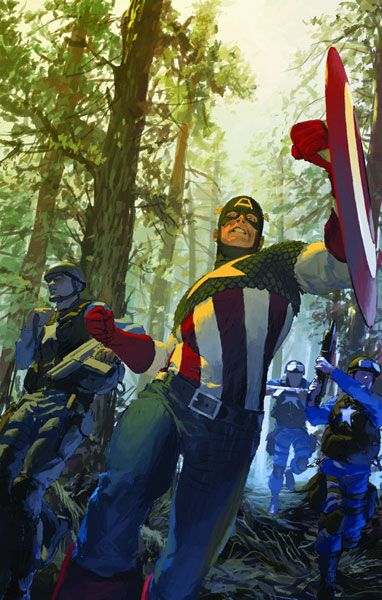With last month's "Who Will Wield..." special giving a definitive answer to the matter of who the next Captain America is, this issue resumes the regular series by following up one of the plot threads introduced by Brubaker some time ago, and the return of the 50s Cap.
Rather appropriately playing off the rumors that Steve Rogers was never dead (something strengthened by the character's actual return), the 50s Cap has been assembling a group of radicals -- though he might not use that term -- who support his view of America. It's a fitting direction for a man who has lost much of his motivation after returning to life, and in other circumstances, you can almost imagine Steve Rogers doing the same, if he woke up to find a world so radically distorted from his view of it.
Unfortunately, Steve Rogers' absence hangs over this issue like a shadow. It's not that Bucky isn't interesting, but after all the fanfare, it's a little odd to see the book ignore Rogers entirely. Perhaps Three Captain Americas in one issue felt like too much?
This aside, there are other elements of the comic that feel a little too "Silver Age." I appreciate that by using a group of white supremacists, Brubaker has stumbled into delicate territory, but depicting Cap's group entirely as one-dimensional, racist hicks feels like lazy shorthand. Indeed, that isn't helped by the ruse Falcon and Bucky use to infiltrate the group, which amounts to little more than dress-up. It'd feel hackneyed in any medium, but with a long history of logic-defying costume switches, one feels like comics should know better.
The backup strip brings Sean McKeever and David Baldeón's Nomad into the fold -- a welcome development for a character whose miniseries was criminally overlooked -- though less welcome for the presence of Araña, a super-heroine who has failed to find an audience once or twice already. The character's appearance distracts from the introduction of Nomad and her own supporting cast, and although the classic superheroics are a welcome counterbalance to the heavy politics of the lead story, it can't stop this from feeling like a lackluster issue overall.

